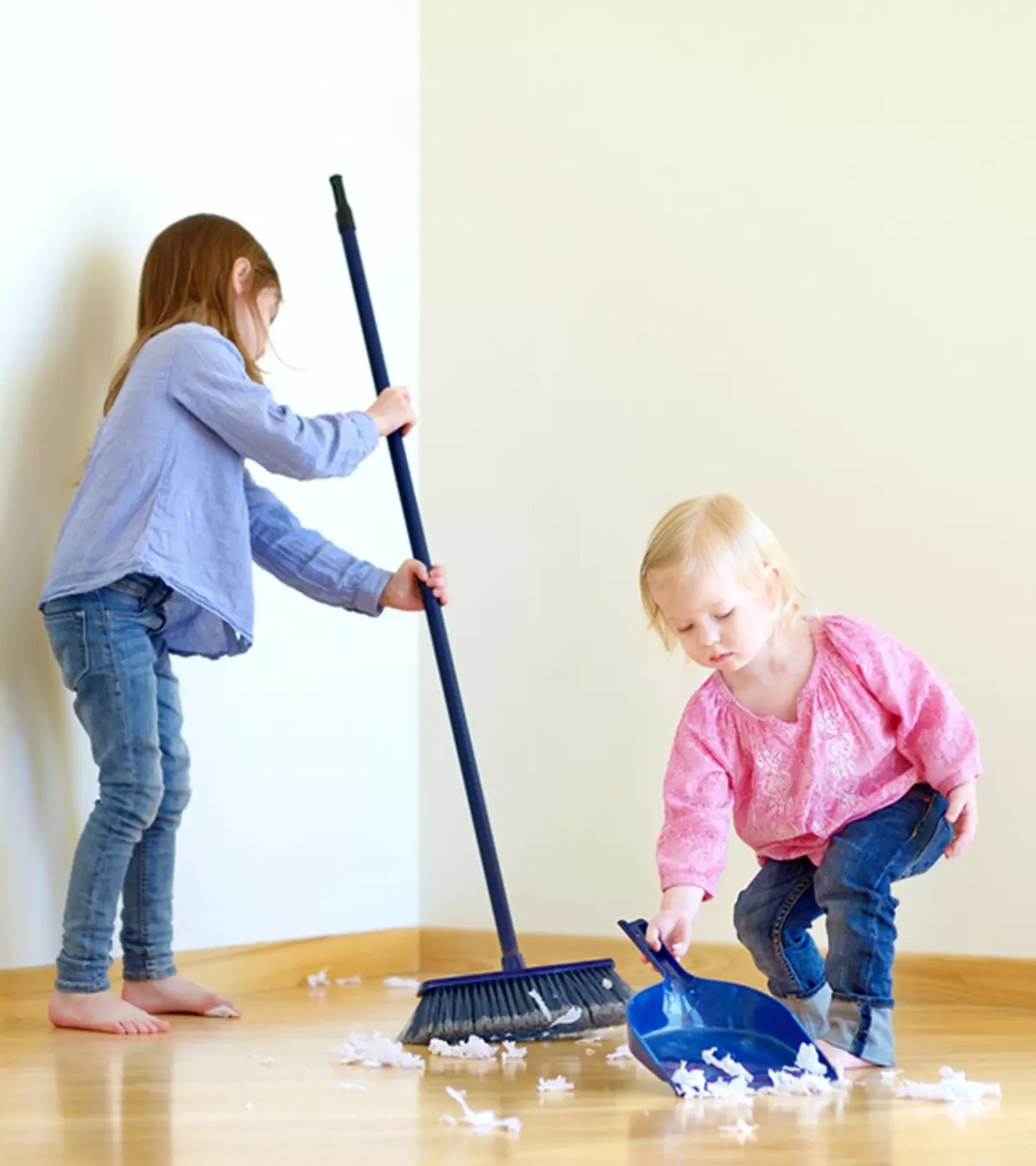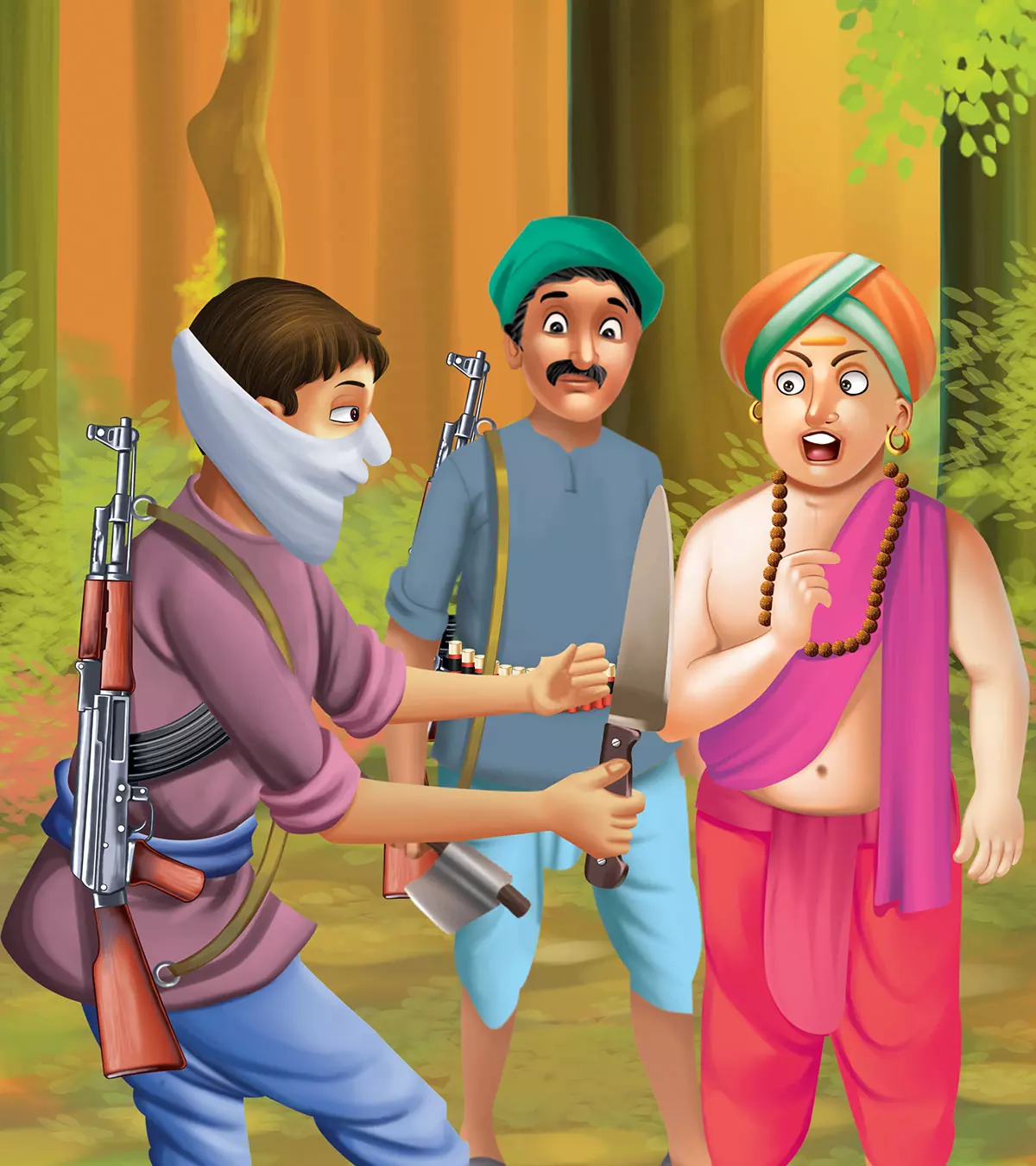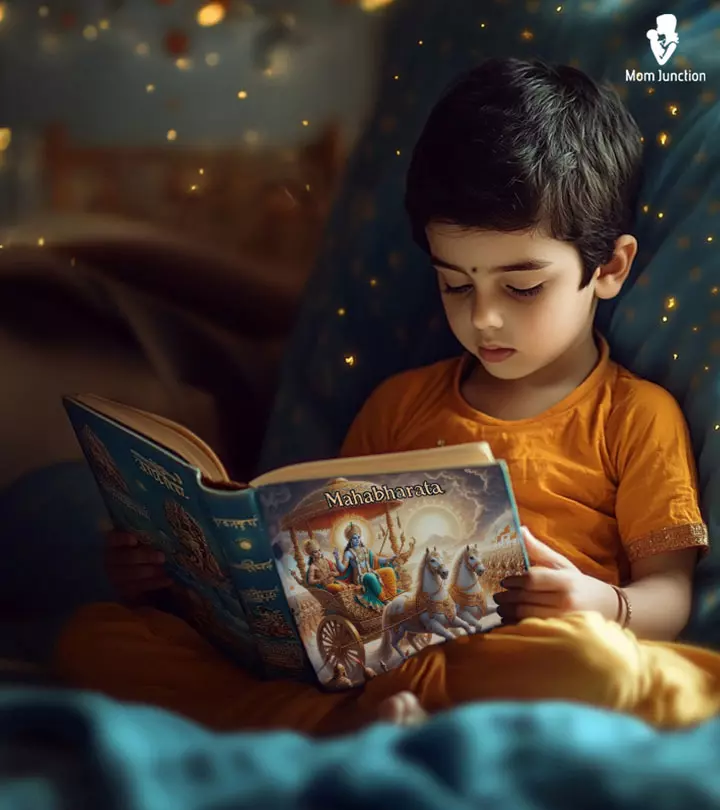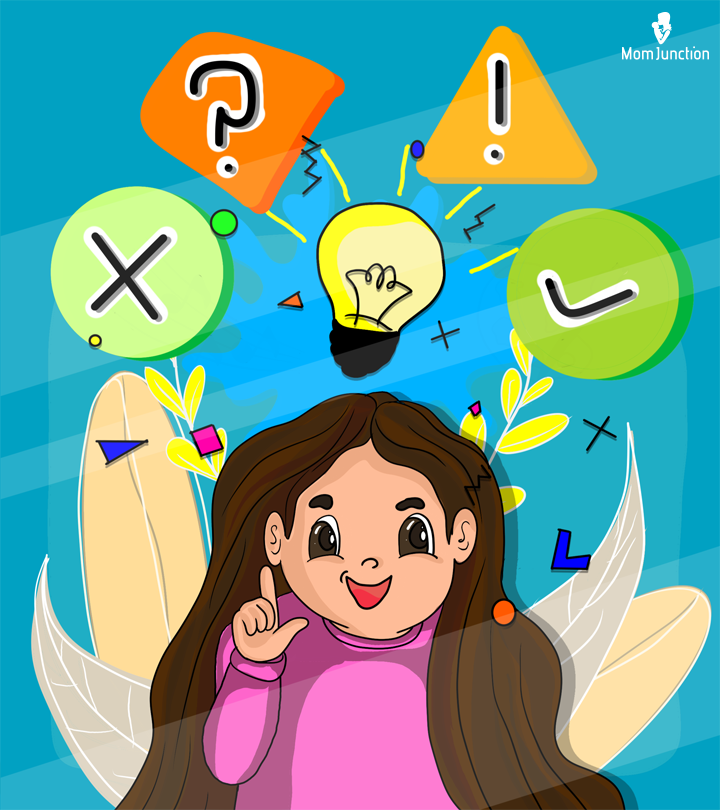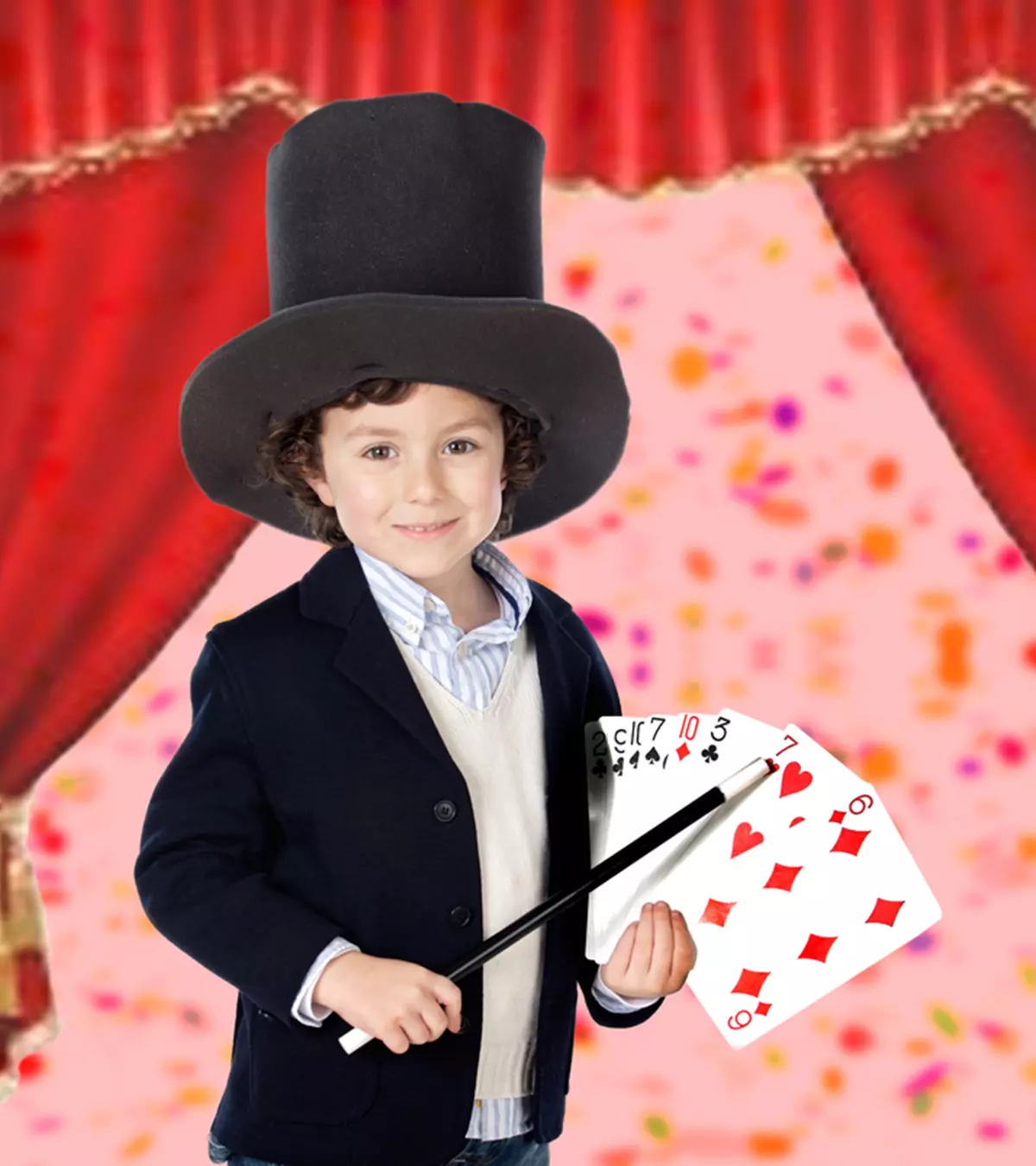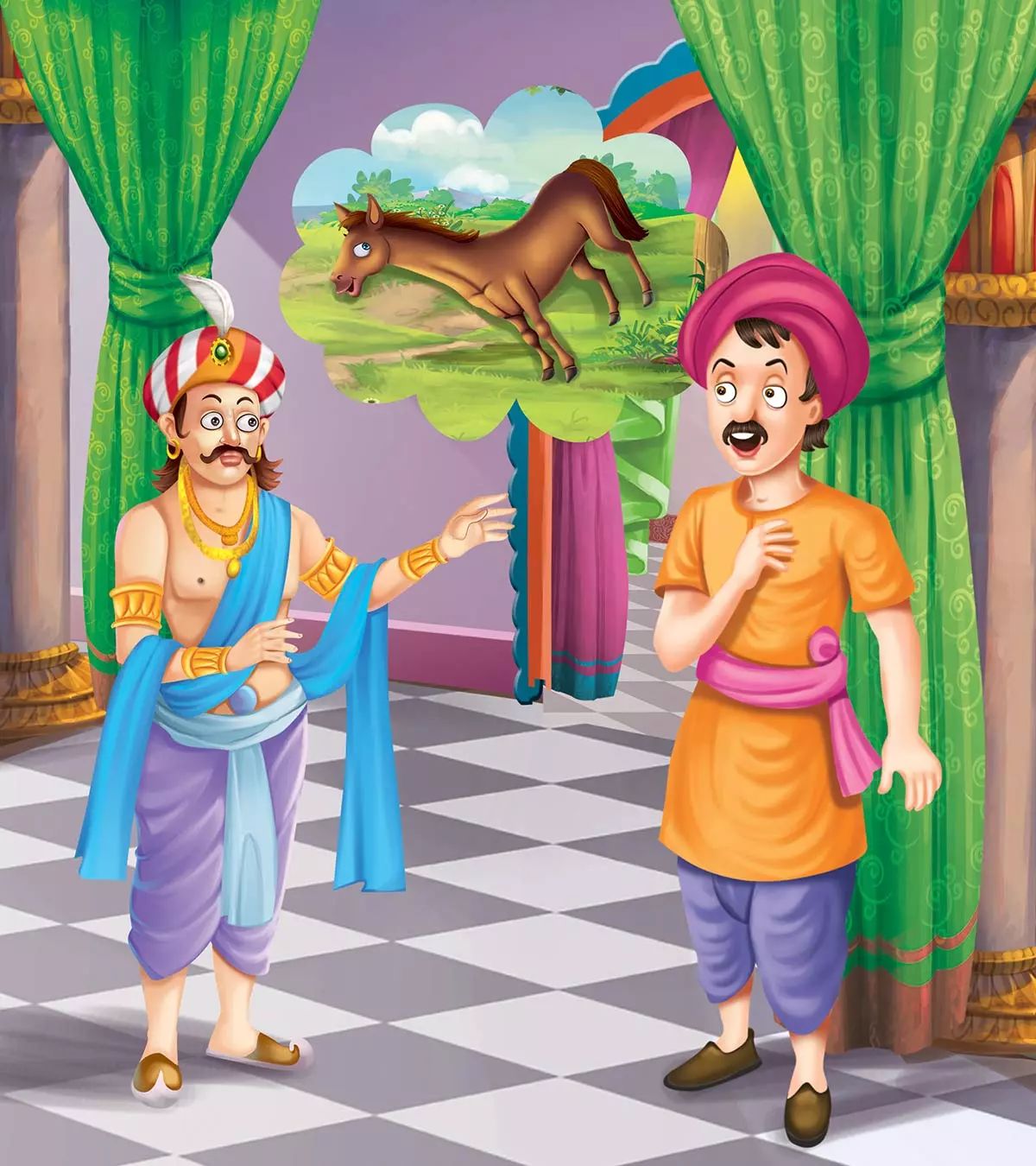
Image: Midjourney/ MomJunction Design Team
Riddles are fun questions or statements that need you to wear a hat of critical thinking and think out of the box to find the correct answer. While they entertain people of all age groups, riddles for teens may intrigue their curious and developing minds. These logic problems motivate teenagers to think out of the ordinary and improve their deduction skills and logical thinking. Also, riddles for high school students effortlessly sharpen the intelligence and inventiveness of teenagers. This quality can improve their problem-solving ability in other aspects of life. Moreover, they add a touch of humor to their lives.
Katey, a blogger and former teacher, shares how she incorporated riddles into her middle school classroom. She recalls, “When I was a middle school teacher, I used to have a classroom rule that if it thunderstorms during class on a Friday, we would scrap the lesson plan for that class and instead do riddles. Every Friday, my kids would scan the sky anxiously looking for thunderclouds. On the Fridays that it actually stormed, they were so excited they could hardly sit still (i)!”
Riddles can either be complicated or basic, and they need a common and logical approach. Read our post as we share some interesting and tricky riddles for teenagers that will not only sharpen their brains but will also tickle their funny bones.
101 Riddles For Teens
Short, tricky riddles
- There are two fathers and two sons in a car. How many people are in the car?
Ans: Three people — a grandfather, a father, and a son
- Where does divorce come before marriage?
Ans: In the dictionary
- An electric train is traveling from east to west, and the wind is blowing from north to south. In which direction does the smoke go?
Ans: Electric trains don’t produce smoke.
- It is lighter than a feather, but you can’t hold it for more than two minutes. What is it?
Ans: Your breath
Infographic: Riddles With Answers For Teenagers
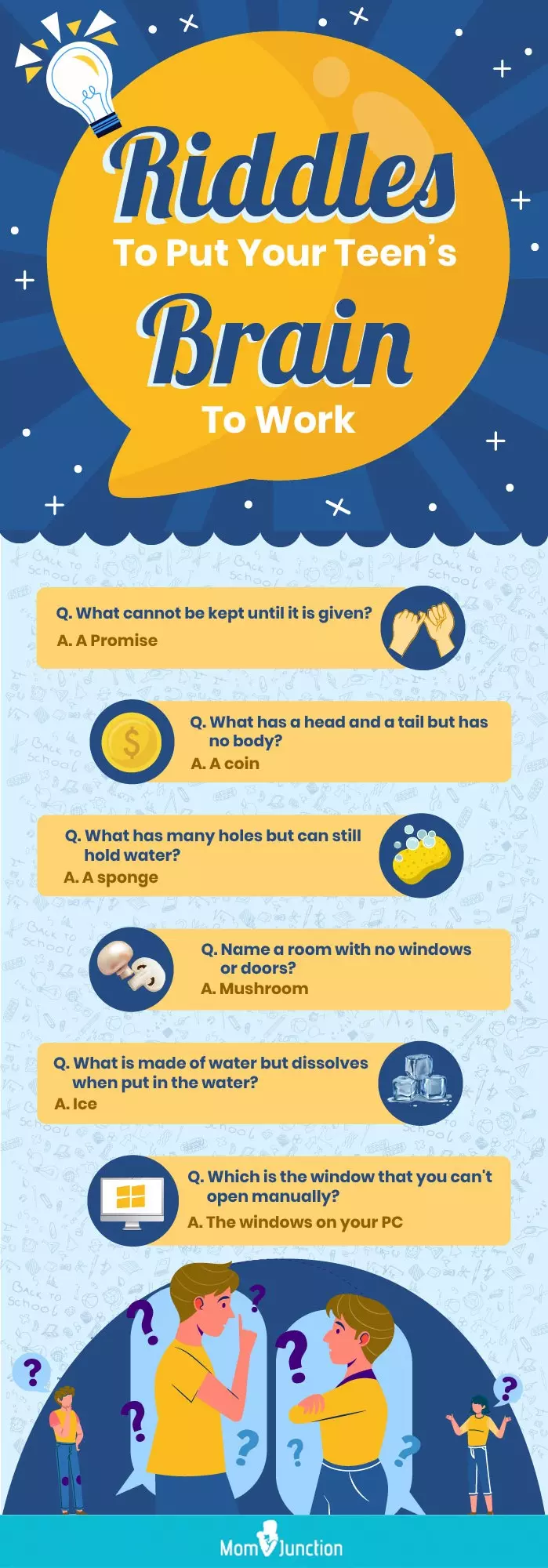
Illustration: Momjunction Design Team
- What gets wetter the more it dries?
Ans: A towel
- What goes up but never comes down?
Ans: Your age
- What can’t be kept until it is given?
Ans: A promise
- What gets sharper the more you use it?
Ans: Your brain
- Which weighs more — a pound of iron bars or a pound of feathers?
Ans: Neither — both weigh the same
- What starts with a P and ends with an X and has hundreds of letters in between?
Ans: A postbox

- Which fruit is always sad?
Ans: A blueberry
- Which tree can you carry in your hand?
Ans: Palm tree
- What has a head and a tail but no body?
Ans: A coin
- What has branches but no leaves or fruits?
Ans: A bank
- What has a face and hands but no body?
Ans: A clock
- What has a mouth but cannot eat and runs but has no legs?
Ans: A river
- What has no beginning, end, or middle?
Ans: A circle
- What has 13 hearts but no brains?
Ans: A pack of playing cards
- What has a neck but no head?
Ans: A bottle
- What do you place on the table and cut but never eat?
Ans: A pack of playing cards
Hard, tricky riddles
- When you have me, you want to share me. But if you share me, you don’t have me any longer. What am I?
Ans: A secret
- What becomes shorter when you add two letters to it?
Ans: The word “short”
- Which vehicle is a palindrome?
Ans: Racecar
- A farmer is walking towards his field. On the way, he sees three frogs sitting on the shoulders of two rabbits. Three parrots and four mice run towards him. How many pairs of legs are going towards the field?
Ans: One pair — the farmer’s
- What is the similarity between “2 + 2 = 5” and your left hand?
Ans: Neither is right
- The person who buys me cannot use it, and the person who uses me cannot buy me or see me. What am I?
Ans: A coffin
- What goes all around the world but stays in one place?
Ans: A stamp
- I have seas with no water, mountains with no land, and towns with no people. What am I?
Ans: A map
- You can hear me but cannot see me. I don’t speak until you do. What am I?
Ans: An echo
- If you are running a race and you pass the person who is running second, which position are you in?
Ans: Second
- Which month has 28 days?
Ans: All months
- What do you break before you use it?
Ans: An egg
- I have no doors but have keys. I have no rooms but have space. You can enter, but you cannot leave. What am I?
Ans: A keyboard
- You can hear me, but you cannot see or touch me? What am I?
Ans: Voice
- Trees are my home, but I never go inside. When I fall off a tree, I am dead. What am I?
Ans: A leaf

- Which is the sweetest and most romantic fruit?
Ans: Honeydew
- What has a thumb and fingers but is not alive?
Ans: A glove
- What is full of holes but holds water?
Ans: A sponge
- What do you find at the end of a line?
Ans: The letter “E”
- I have hands, but I cannot shake your hands. I have a face, but I cannot smile at you. Who am I?
Ans: A clock
- A man builds a house with all four walls facing south. A bear walks past the house. What color is the bear?
Ans: White. It is a polar bear.
- What can you find in a minute or an hour but never in a day or a month?
Ans: The letter “U”
- I am made of water, but I die when you put water on me. Who am I?
Ans: Ice
- Name three consecutive days that aren’t the days of the week.
Ans: Yesterday, today, tomorrow
- When I am young, I am tall. I grow shorter as I become older. What am I?
Ans: A candle/ pencil
 Be watchful
Be watchful- What grows bigger the more you take away from it?
Ans: A hole
- Can a man go for eight days without sleeping?
Ans: Yes, he can sleep at night.
- Which room has no windows or doors?
Ans: Mushroom
- What breaks the moment you say its name?
Ans: Silence
- If you drop me on the ground, I survive. But if you drop me in water, I die. What am I?
Ans: Paper
- I am smooth as silk. I can be hard or soft. I fall but cannot climb. What am I?
Ans: Rain
Funny riddles
- What is a teenager’s favorite phrase during math class?
Ans: “I can’t even.”
- What problem does a teacher with uncontrollable eyes have?
Ans: He cannot control his pupils.
- A man shaves throughout the day, yet he has a beard. How?
Ans: He is a barber.
- What can make an octopus laugh?
Ans: Ten-tickles (tentacles)
- During which month do people sleep the least?
Ans: February
- I grow richer with alcohol but die with water. Who am I?
Ans: Fire

- Kate’s mother had four daughters — Monday, Tuesday, Wednesday, and _____. What was the name of the fourth daughter?
Ans: Kate
- Which window can’t you open literally?
Ans: The Windows on your laptop.
- What sounds like a war machine but is a piece of clothing?
Ans: Tank top
- What did the math book say to the pencil?
Ans: I am full of problems.
- What do you get when you mix sulfur, tungsten, and silver?
Ans: Swag
- What did the angry electron say when it was repelled?
Ans: Let me atom!
- What is the ancient invention that allows people to see through walls?
Ans: A window
- When do you go at red and stop at green?
Ans: While eating a watermelon
- How many books can you pack inside an empty backpack?
Ans: One. It is no longer empty after that.
- What is the center of gravity?
Ans: The letter “V”
- What type of music do rabbits like?
Ans. Hip Hop!
- What did the beach say when the tide came in?
Ans: Long time, no sea
- What is black and white and read all over?
Ans: A newspaper
- What kind of food do mummies eat?
Ans: Wraps
Brainteasers
- Which English word has three consecutive double letters?
Ans: Bookkeeper
- Which is the only English letter with “uu” in it?
Ans: Vacuum.
- Which is the only English word with “ii” in it?
Ans: Skiing
- You live in a one-story house made entirely of redwood. What color are the stairs?
Ans: What stairs? It is a one-story house.
- My first letter is in chocolate but not in ham. My second is in cake and jam. My third is in tea but not in coffee. My whole is a friend who likes to sleep. Who am I?
Ans: A cat

- You are alone at home and sleeping when your friends ring the doorbell. They have come for breakfast. You have cornflakes, bread, jam, a carton of milk, and a bottle of juice. What will you open first?
Ans: Your eyes
- I am hard to find, difficult to leave, and impossible to forget. What am I?
Ans: A friend
- Find the number less than 100 that is increased by one-fifth of its value when its digits are reversed.
Ans: 45 (1/5*45 = 9, 9+45 = 54)
 Quick tip
Quick tip- What did the English book say to the Algebra book?
Ans: Don’t change the subject.
- What has a bottom at the top?
Ans: Your legs
Christmas riddles
- Is Santa good at karate?
Ans: Yes, he has a black belt.
- What is a snowman called in summer?
Ans: A puddle
- What can go up the chimney down but never go down the chimney up?
Ans: An umbrella
- Who is never hungry on Christmas?
Ans: A stuffed turkey
- What do you call a person who is scared of Santa Claus?
Ans: Claustrophobic
- What did Adam say on the day before Christmas?
Ans: It is Christmas, Eve!
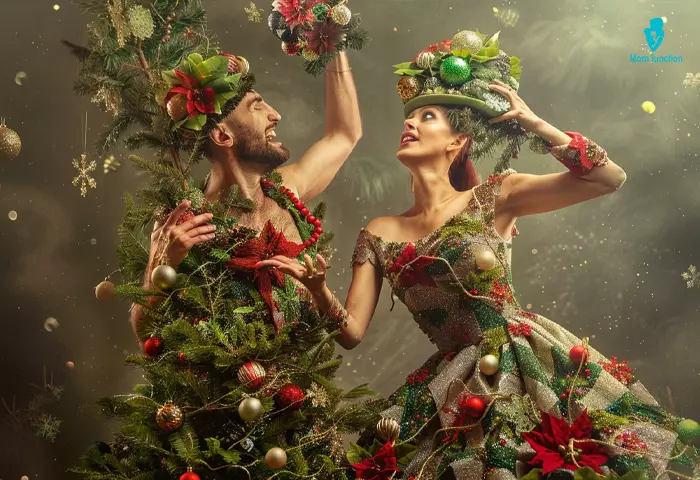
- In which year did Christmas and New Year fall in the same year?
Ans: Every year
- What keeps a Christmas tree smelling fresh?
Ans: Orna-mints
- Where does Christmas come before Thanksgiving?
Ans: In the dictionary
- If a lion had a Christmas music album, what would it be called?
Ans: Jungle bells
- What do elves learn in school?
Ans: The elfabet
- What did the Christmas tree say to the Christmas stocking?
Ans: Aren’t you sick and tired of just hanging around?
- Which reindeer can you see in outer space?
Ans: Comet
- Which is the fastest reindeer?
Ans: Dasher
- How do reindeer learn?
Ans: They are elf-taught
- What did Mrs. Claus say to Santa when she looked at the sky?
Ans: I see some rain, dear.
- What did Santa say when the toys were naughty?
Ans: Toys will be toys.
- What is your parents’ favorite Christmas carol song?
Ans: Silent Night
- Which direction does Santa travel in when he leaves his house?
Ans: South because Santa lives in the North Pole
- Can Christmas trees knit well?
Ans: No, they always drop their needles.
Illustration: Best Riddles For Teenagers With Answers

Image: Dall·E/MomJunction Design Team
Frequently Asked Questions
1. How can riddles help teens develop critical thinking skills?
Riddles function as mental challenges that develop critical thinking by encouraging problem-solving and logical-reasoning skills to get the answers. It also helps to improve their focus and concentration while boosting their memory skills.
2. What are the benefits of solving riddles for teens?
Besides improving cognitive skills, solving riddles, mind benders, word games, and teasers is also a great way to practice endurance, perseverance, and calmness. It can help enhance spatial-reasoning skills and memory, boosts creativity, and help the brain relax (1). Riddles are like enigmas that also allow teenagers to practice asking the right questions to find solutions (2).
3. How can teachers use riddles to help teens learn new concepts?
Children and teenagers can easily pick up new skills at school if they enjoy what they learn and the learning process. Therefore, teachers can use riddles as brain games when teaching new concepts to pique their curiosity about the topic (2).
4. What tips can teens use to help them solve riddles more effectively?
Ask teens to read the instructions and clues carefully, think creatively, and look for contextual clues. You can also take help from others, but keeping calm is the way to go when solving riddles.
Asking riddles for teens is a great way to keep your teens busy and make them think. While engaging them in a fun game, these riddles can also help develop teens’ critical thinking skills and problem-solving abilities. Additionally, it fosters social interaction among teens. You do not have to plan out an entire day dedicated to riddles. You can use them as icebreaker questions for teens or slip in some of these at dinner, lunch, or during a car ride. It will help train their brain to arrive at logical answers in the fastest way. Thus, practicing some of these riddles regularly will help their mental capabilities improve as they get a chance to exercise their brain.
Challenge teenage minds with intriguing riddles that spark critical thinking and creativity. Engaging and thought-provoking, these riddles for teens provide entertainment while enhancing cognitive skills and problem-solving abilities.
Key Pointers
- Riddles are among the best critical thinking and creativity exercises for teens and kids.
- Teens can practice out-of-the-box thinking and logical reasoning through riddles, improving their problem-solving abilities.
- Riddles can also teach teens to become more observant, work on their comprehension skills, and become masters at wordplay.
- They help engage teens’ attention and improve their concentration, patience, and perseverance.
- Riddles for teens can make for entertaining breaks during class hours, allowing them to relax and use their deductive skills simultaneously.
Personal Experience: Source
MomJunction articles include first-hand experiences to provide you with better insights through real-life narratives. Here are the sources of personal accounts referenced in this article.
i. 13 yes/no riddles.http://www.havingfunathome.com/2008/10/13-yesno-riddles.html
References
- How Using Brain Teasers in Classrooms Can Be Good for Students?
https://globalindianschool.org/jp/tokyo/blog-details/benefits-of-brain-teasers - Riddles – The Way of Fostering Your Children’s Thinking.
https://novakdjokovicfoundation.org/riddles-the-way-of-fostering-your-childrens-thinking/
Community Experiences
Join the conversation and become a part of our nurturing community! Share your stories, experiences, and insights to connect with fellow parents.
Read full bio of Dana Sciullo
Read full bio of Nisha Bharatan
Read full bio of Harshita Makvana
Read full bio of Trisha Chakraborty








